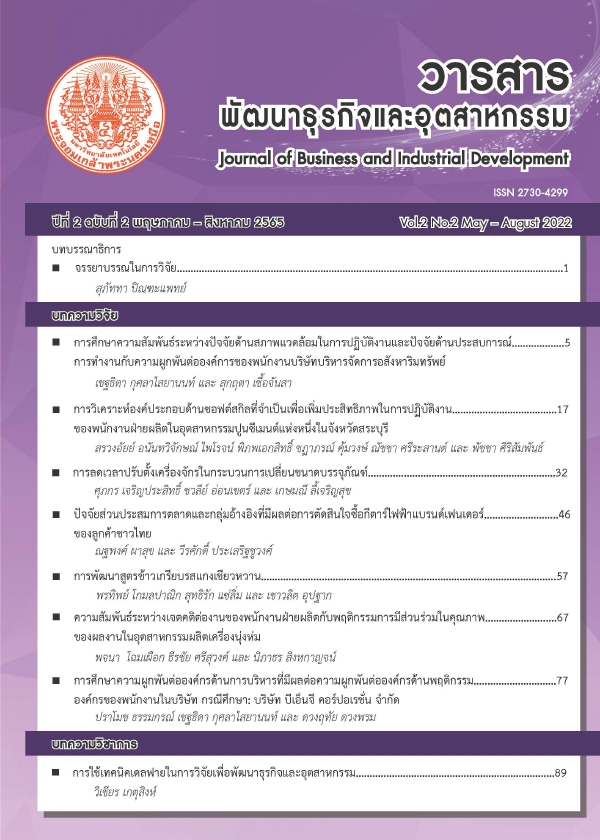Relationship between Work Attitudes and Participative Behavior in Work Quality Outcomes in Garment Industries
Keywords:
Work Attitudes, Participative Behavior, Work Quality OutcomesAbstract
This research aimed to study: 1) the levels of work attitudes and participative behavior in work quality outcomes and 2) the relationship between work attitudes and participative behavior in work quality outcomes. The research applied a survey method. The participants were the operation staff of Oriental Garment Co., Ltd, at headquarter, totaling 262. The research tool was a questionnaire. The collected data were analyzed by using statistics of frequency, percentage, mean, standard deviation, t-test and F-test (One-way Analysis of Variance), and Pearson Product-Moment Correlation Coefficient. The results showed that 1) The overall work attitude was at a moderate level arranged as followed: the attitude in behavior, the attitude in thinking and the attitude in feeling. 2) The participative behavior in work quality outcomes was at a high level. 3) The differences in gender, education, and experience showed differences in work attitudes. 4) The differences of participative behavior in work quality outcomes. and 5) The relationship between work attitudes and participative behavior in work quality outcomes in the positive direction at 0.05 significant level.
References
อนุพงษ์ อินฟ้าแสง. (2560). ศักยภาพการปรับตัวเข้าสู่ตลาดโลกของอุตสาหกรรมสิ่งทอและเครื่องนุ่งห่มไทย. วารสารวิชาการมหาวิทยาลัยธนบุรี, 11(26).
จิราพร คำประพัฒน์ และคณะ. (2561). การศึกษาเจตคติต่อความผูกพันองค์กรของพนักงานฝ่ายผลิต บริษัท โทรลดีไซค์ จำกัด. วารสารวิจัยและนวัตกรรม สถาบันการอาชีวศึกษากรุงเทพมหานคร, 1(2).
พจนา โฉมเผือก และคณะ. (2555). ความสัมพันธ์ระหว่างเจตคติต่องานและความเชื่ออำนาจในตนกับพฤติกรรมการมีส่วนร่วมในคุณภาพของผลงาน กรณีศึกษา บริษัท โอเรียนตอลการ์เมนท์ จำกัด.
Krejcie, R.V., & Morgan, D.W. (1970). Determining Sample Size for Research Activities. Educational and Psychological Measurement, 30, 607-610.
Rhodes, S. R. (1983). Age-related Differences in Work Attitudes and Behavior: A Review and Conceptual Analysis. Psychological Bulletin, 93(2), 328–367. https://doi.org/10.1037/0033-2909.93.2.328
จุฑารัตน์ เอื้ออำนวย. (2549). จิตวิทยาสังคม. กรุงเทพมหานคร: แอคทีฟ พริ้นท์
ศักดิ์ สุนทรเสณี. (2531). เจตคติ. กรุงเทพมหานคร. ดีดีบุคสโตร์.
Cherian, J., Gaikar, V., Paul, Raj., & Pech, R. (2021). Corporate Culture and Its Impact on Employees’ Attitude, Performance, Productivity, and Behavior: An Investigative Analysis from Selected Organizations of the United Arab Emirates (UAE). Journal of Open Innovation: Technology, Market, and Complexity, 7(1).
Bireswari R. Vimala. (2013). Organizational Performance with Employee Attitude and Behavior Respect to IT Industry, Bangalore - An Empirical Study. papers.ssrn https://papers.ssrn.com/sol3/papers.cfm?abstract_id=2210737
Downloads
Published
How to Cite
Issue
Section
License

This work is licensed under a Creative Commons Attribution-NonCommercial-NoDerivatives 4.0 International License.





